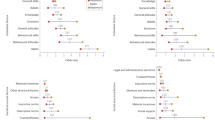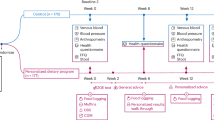Abstract
Evidence on the impact of information campaigns on meat consumption patterns is limited. Here, using a dataset of more than 100,000 meal selections over 3 years, we examine the long-term effects of an informational intervention designed to increase awareness about the role of meat consumption in climate change. Students randomized to the treatment group reduced their meat consumption by 5.6 percentage points with no signs of reversal over 3 years. Calculations indicate a high return on investment even under conservative assumptions (~US$14 per metric ton CO2eq). Our findings show that informational interventions can be cost effective and generate long-lasting shifts towards more sustainable food options.
This is a preview of subscription content, access via your institution
Access options
Access Nature and 54 other Nature Portfolio journals
Get Nature+, our best-value online-access subscription
$29.99 / 30 days
cancel any time
Subscribe to this journal
Receive 12 digital issues and online access to articles
$119.00 per year
only $9.92 per issue
Buy this article
- Purchase on Springer Link
- Instant access to full article PDF
Prices may be subject to local taxes which are calculated during checkout

Similar content being viewed by others
Data availability
Individual participant data that underlie the results reported in this article, after de-identification, will be made available to researchers who provide a methodologically sound proposal. Proposals should be directed to corresponding author at jalil@oxy.edu; to gain access, data requestors will need to sign a data access agreement. Additional data/materials, that is, GHG data, ROI calculations, informed consent form and intervention materials (handouts, surveys and slides), may be found at https://doi.org/10.17605/OSF.IO/5H8U7.
Code availability
The code used for this analysis is available from the corresponding author on request.
References
Godfray, H. C. J. et al. Meat consumption, health, and the environment. Science 361, eaam5324 (2018).
Poore, J. & Nemecek, T. Reducing food’s environmental impacts through producers and consumers. Science 360, 987–992 (2018).
Springmann, M., Clark, M. A., Rayner, M., Scarborough, P. & Webb, P. The global and regional costs of healthy and sustainable dietary patterns: a modelling study. Lancet Planet. Health 5, e797–e807 (2021).
Springmann, M., Godfray, H. C. J., Rayner, M. & Scarborough, P. Analysis and valuation of the health and climate change cobenefits of dietary change. Proc. Natl Acad. Sci. USA 113, 4146–4151 (2016).
Tilman, D. & Clark, M. Global diets link environmental sustainability and human health. Nature 515, 518–522 (2014).
Norwood, F. B. & Lusk, J. L. Compassion, by the Pound: The Economics of Farm Animal Welfare (Oxford Univ. Press, 2011).
Wellesley, L., Froggatt, A. & Happer, C. Changing Climate, Changing Diets: Pathways to Lower Meat Consumption (Chatham House, 2015).
Willett, W. et al. Food in the Anthropocene: the EAT–Lancet Commission on healthy diets from sustainable food systems. Lancet 393, 447–492 (2019).
Bailey, R., Froggatt, A. & Wellesley, L. Livestock—Climate Change’s Forgotten Sector: Global Public Opinion on Meat and Dairy Consumption (Chatham House, 2014).
Pechey, R., Reynolds, J. P., Cook, B., Marteau, T. M. & Jebb, S. A. Acceptability of policies to reduce consumption of red and processed meat: a population-based survey experiment. J. Environ. Psychol. 81, 101817 (2022).
Jalil, A. J., Tasoff, J. & Bustamante, A. V. Eating to save the planet: evidence from a randomized controlled trial using individual-level food purchase data. Food Policy 95, 101950 (2020).
Bianchi, F., Dorsel, C., Garnett, E., Aveyard, P. & Jebb, S. A. Interventions targeting conscious determinants of human behaviour to reduce the demand for meat: a systematic review with qualitative comparative analysis. Int. J. Behav. Nutr. Phys. Act. 15, 102 (2018).
Mathur, M. B. et al. Interventions to reduce meat consumption by appealing to animal welfare: meta-analysis and evidence-based recommendations. Appetite 164, 105277 (2021).
Garnett, E. E., Balmford, A., Sandbrook, C., Pilling, M. A. & Marteau, T. M. Impact of increasing vegetarian availability on meal selection and sales in cafeterias. Proc. Natl Acad. Sci. USA 116, 20923–20929 (2019).
Garnett, E. E., Marteau, T. M., Sandbrook, C., Pilling, M. A. & Balmford, A. Order of meals at the counter and distance between options affect student cafeteria vegetarian sales. Nat. Food 1, 485–488 (2020).
Garnett, E. E., Balmford, A., Marteau, T. M., Pilling, M. A. & Sandbrook, C. Price of change: does a small alteration to the price of meat and vegetarian options affect their sales? J. Environ. Psychol. 75, 101589 (2021).
Schwitzgebel, E., Cokelet, B. & Singer, P. Do ethics classes influence student behavior? Case study: teaching the ethics of eating meat. Cognition 203, 104397 (2020).
Lohmann, P. M., Gsottbauer, E., Doherty, A. & Kontoleon, A. Do carbon footprint labels promote climatarian diets? Evidence from a large-scale field experiment. J. Environ. Econ. Manage. 114, 102693 (2022).
Nutrient lists from standard reference legacy (2018). USDA https://www.nal.usda.gov/legacy/fnic/nutrient-lists-standard-reference-legacy-2018 (2018).
Rippin, H. L. et al. Variations in greenhouse gas emissions of individual diets: associations between the greenhouse gas emissions and nutrient intake in the United Kingdom. PLoS ONE 16, e0259418 (2021).
Nordhaus, W. D. Revisiting the social cost of carbon. Proc. Natl Acad. Sci. USA 114, 1518–1523 (2017).
Carfora, V., Catellani, P., Caso, D. & Conner, M. How to reduce red and processed meat consumption by daily text messages targeting environment or health benefits. J. Environ. Psychol. 65, 101319 (2019).
Acknowledgements
We are grateful to Animal Charity Evaluators for funding and to H. Case, M. Haile, S. Herdman, L. Ingram, A. Jack, E. Richman, T. Santos, Y. Li and D. Wright for valuable research assistance. The funder had no role in study design, data collection and analysis, decision to publish or preparation of the manuscript. We are indebted to the staff of the host college; without their support, hard work and help, the project would not have been possible.
Author information
Authors and Affiliations
Contributions
A.J.J., J.T. and A.V.B. conceived the idea. A.J.J. and J.T. collected and analysed the data. A.J.J. designed the intervention and wrote the paper. J.T. and A.V.B. edited the paper.
Corresponding author
Ethics declarations
Competing interests
The authors declare no competing interests.
Peer review
Peer review information
Nature Food thanks Nina Weingarten, Paul Lohmann and Clare D’Souza for their contribution to the peer review of this work.
Additional information
Publisher’s note Springer Nature remains neutral with regard to jurisdictional claims in published maps and institutional affiliations.
Supplementary information
Supplementary Information
Supplementary Tables 1–15, Discussion and Figs. 1–4.
Rights and permissions
Springer Nature or its licensor (e.g. a society or other partner) holds exclusive rights to this article under a publishing agreement with the author(s) or other rightsholder(s); author self-archiving of the accepted manuscript version of this article is solely governed by the terms of such publishing agreement and applicable law.
About this article
Cite this article
Jalil, A.J., Tasoff, J. & Bustamante, A.V. Low-cost climate-change informational intervention reduces meat consumption among students for 3 years. Nat Food 4, 218–222 (2023). https://doi.org/10.1038/s43016-023-00712-1
Received:
Accepted:
Published:
Issue Date:
DOI: https://doi.org/10.1038/s43016-023-00712-1
This article is cited by
-
Sustainable dietary choices improved by reflection before a nudge in an online experiment
Nature Sustainability (2023)
-
Long-lasting impact of information on meat consumption
Nature Food (2023)



